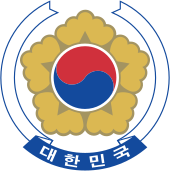Criminal_Code_of_South_Korea
Penal Code (South Korea)
South Korean criminal law code
The Penal Code or Criminal Act[1](형법[2]) is the criminal law code in South Korea. The first modern criminal code in Korea was introduced during Japanese rule. From 1912 to 1953, the Japanese Criminal code was used for around 40 years. In September 1953, South Korea enacted its own criminal code.
This article has multiple issues. Please help improve it or discuss these issues on the talk page. (Learn how and when to remove these template messages)
|
